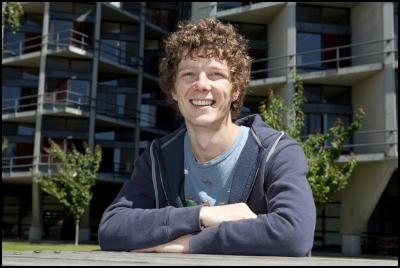Rhodes Scholar motivated by impact of Government support
Rhodes Scholar motivated by impact of Government support for UC science
November 1, 2013
University of Canterbury (UC) current Rhodes Scholar at Oxford James Bonifacio today described the $260 million Government support for UC as tremendously motivating for the future of UC science.
If post-quake UC is to be a competitive science research and teaching institution that attracts students and leading researchers, then it needs upgraded infrastructure and a distinctive brand, he said.
Speaking from Oxford University overnight, Bonifacio said there is a unique opportunity for UC to learn from its earthquake experiences and to plan strategically for the future as it rebuilds, following yesterday’s announcement by Prime Minister John Key on campus to invest $260 million in the UC rebuild.
``The proposed UC Regional Science and Innovation Centre (RSIC), made possible by this Government support, is representative of the type of ambitious long-term thinking that UC and Canterbury needs.
``However, it is important to remember that people are a university’s most valuable asset. New infrastructure alone does not create a thriving university, although it can certainly help to attract world-class academics and foster research.
``In addition, a healthy and diverse intellectual climate requires that we give adequate support to non-STEM (science, technology, engineering, and mathematics) subjects.
``Future students can look forward to having modern, open science facilities. Well-designed spaces can make a huge difference to one’s university learning and social experiences—something I have recently experienced first-hand at Oxford in the vibrant atmosphere of the new Mathematics Institute.
``Such spaces also encourage collaboration and the transfer of ideas through casual interactions amongst academics and students, both within and across disciplines—such interdisciplinary collaboration will be needed to solve complex problems such as climate change.
``The new science facilities should help to improve students’ learning experiences and to equip them to tackle such important future problems, as well as to thrive in modern collaborative workplaces.
``Modern facilities will naturally attract students, but also the improved outreach ability that UC Science will have will strengthen connections with local schools.
``Hopefully this will expose some young people to the excitement of science when they might not have had the opportunity otherwise, and perhaps it will even encourage them to pursue science at university.
``The new facilities will be designed to encourage collaboration with industry. This will be an important component of making graduates more employable and fostering innovation in the region.
``The support that the Government has given UC science is vital if we are to be globally relevant in science education and research in the future. It is important that we not only invest in long-term structural foundations, but that we leverage this financial support to attract and retain leading researchers so that we can move forward also on a strong intellectual foundation,’’ Bonifacio said.
Pro Vice-Chancellor Professor Paul Fleming said the announcement would help attract more students to UC from next year.
``When completed, UC will have some of the best science facilities in the southern hemisphere. The campus environment will provide a truly inspiring experience for all our students and staff.
``The Regional Science and Innovation Centre gives (RSIC) is a unique opportunity to develop its science learning and teaching in new directions which will increase the employability of our science graduates.
``Our research will also benefit from being undertaken in state-of-the-art laboratories. Collaboration by scientists from within UC and also from external organisations will add greatly to the regional and national scientific effort,’’ Professor Fleming said.

ENDS


 Parrot Analytics: Paramount Earnings - Can Ellison Strike The Right Balance?
Parrot Analytics: Paramount Earnings - Can Ellison Strike The Right Balance? NZ Trade and Enterprise: NZ Businesses Deliver $340 Million Trade Boost For New Zealand In China
NZ Trade and Enterprise: NZ Businesses Deliver $340 Million Trade Boost For New Zealand In China Ngā Manu Nature Reserve: Celebrating The Return Of Tuatara To Ngāti Koata And Brook Waimārama Sanctuary
Ngā Manu Nature Reserve: Celebrating The Return Of Tuatara To Ngāti Koata And Brook Waimārama Sanctuary Employers & Manufacturers Association: Work-related Injuries In Manufacturing Create $1.23 Billion Economic Burden On NZ
Employers & Manufacturers Association: Work-related Injuries In Manufacturing Create $1.23 Billion Economic Burden On NZ Consumer NZ: Consumer NZ Questions Supermarket Specials: Are They Really Saving You Money?
Consumer NZ: Consumer NZ Questions Supermarket Specials: Are They Really Saving You Money? NIWA: October Climate Summary - A Mild Month Overall, Very Wet For Much Of The South Island
NIWA: October Climate Summary - A Mild Month Overall, Very Wet For Much Of The South Island



